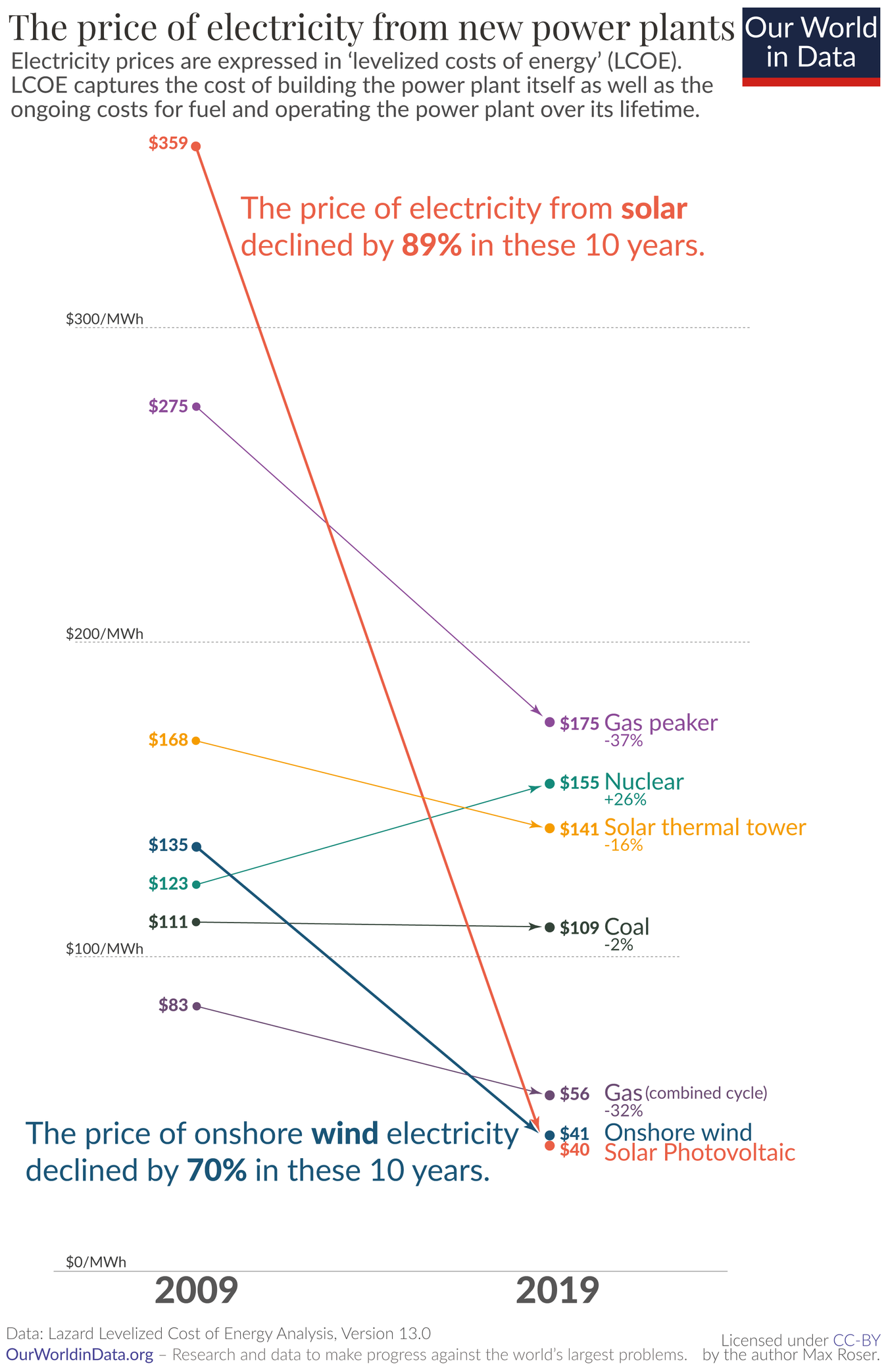Technology
This is the official technology community of Lemmy.ml for all news related to creation and use of technology, and to facilitate civil, meaningful discussion around it.
Ask in DM before posting product reviews or ads. All such posts otherwise are subject to removal.
Rules:
1: All Lemmy rules apply
2: Do not post low effort posts
3: NEVER post naziped*gore stuff
4: Always post article URLs or their archived version URLs as sources, NOT screenshots. Help the blind users.
5: personal rants of Big Tech CEOs like Elon Musk are unwelcome (does not include posts about their companies affecting wide range of people)
6: no advertisement posts unless verified as legitimate and non-exploitative/non-consumerist
7: crypto related posts, unless essential, are disallowed
view the rest of the comments

Pretty clearly shows why there’s no future for nuclear power.
Even for filling gaps in renewables, peaker plants are getting cheaper and don’t take 15 years to build.
This is always a weird take to me because it always ignores the fact that nuclear has been screwed continuously for decades. If any other tecbology, renewable energy or not, had the same public and private blockers did it would also have no future.
On the contrary: I'd say it implicitly relies on that fact, which is why the argument that it takes 15 years to build is valid. Because nuclear has been screwed, there's no pipeline of under-construction plants coming online any sooner than that.
It may not be fair that nuclear's been screwed, but that doesn't change history. The only thing that matters is what's better when construction is starting in 2023.
While I don't think it relies on that fact, you are correct with the rest.
And it is always a question how they calculated handling of nuclear waste.
There are options, we can use coal and natural gas for on demand power to fill the gaps in renewables, we don't have to quit all at once. New ideas for energy storage and comming around, some of them might be useful for small towns, others for remote places.
there is very very very little nuclear waste.this is complete handwringing. it can be buried and forgotten.
Bigger issue is the carbon costs and pay back periods. Nuclear (unless you've got sources otherwise stating) is green in it's planning phase but not as often in execution. A shit ton of concrete is used, and the plants rarely operate at the capacity they are expected to (or have in the past). Open to revision but that's my current understanding.
They are a massive upfront carbon cost and only become carbon neutral or negative relative to fossil fuels 20+ years down the line.
Do you have data on that? A modern nuclear power plant is going to be in the 500-1000+ MW range. I have a hard time imagining that even operating at half capacity that they do not offset the carbon used for concrete within a relatively short order. But if that is in fact the case I'd love to see data saying so, so that I can correct my thinking.
Kyle Hill has a nice video about power plants waste disposal, one of cleanest methods there is.
edit: he actually went to the plant and showed how it's done
He literally hugged and kissed a canister of nuclear waste to show how safe it is. Kyle Hill is my hero
I think that's too simplistic of a view. Part of the high cost of nuclear is because of the somewhat niche use. As with everything, economies of scale makes things cheaper. Supporting one nuclear plant with specialized labor, parts, fuel, etc is much more expensive then supporting 100 plants, per Watt.
I can't say more plants would drastically reduce costs. But it would definitely help.
The last nuclear power plant built in the US bankrupted Westinghouse, was 7 years late, $14 billion over budget, and is set to raise electricity rates in Georgia.
Nuclear is not a solution.
The source article actually talks about this and measured data suggests nuclear cost actually went up, despite more capacity being built.
This is the first time, I've read this anywhere. More sources/studies would be really important. And there is lots of interpretations to be had on the why, but assuming the article isn't completely off the mark, that's cold, hard data suggesting that your (perfectly reasonable) assumption is actually wrong, after all.
Interesting, I'll have to look at the source article.
But as far as I'm aware the total amount of nuclear power has been decreasing in recent years. This might change with China's future plants.
I've also read about small modular reactor designs gaining traction, which would help alleviate the heavy costs of one off plants we currently design and build.
Not saying the source is wrong, just saying that's what I used to form my opinion.
bullshit regulatory costs can increase infinitely without nay change to the underlying engineering or economics. that's 100% the cause of the price increses
This chart is worthless, so it doesn't show anything. Like 2 data points for this? Seriously? And there was a pandemic and a war since then...